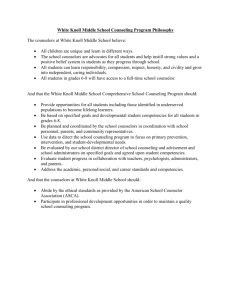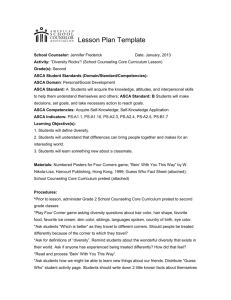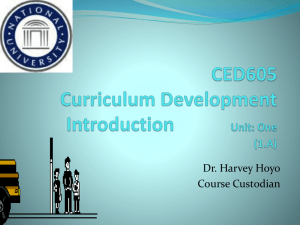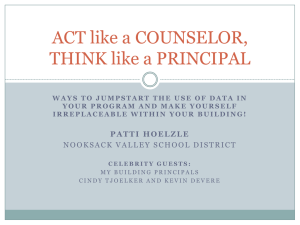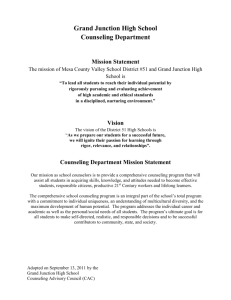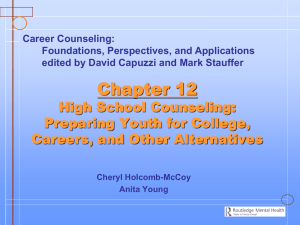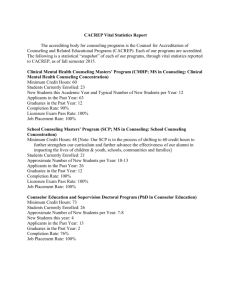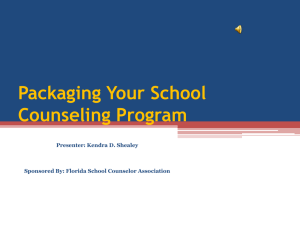Presentation - Utah School Counselor Association
advertisement
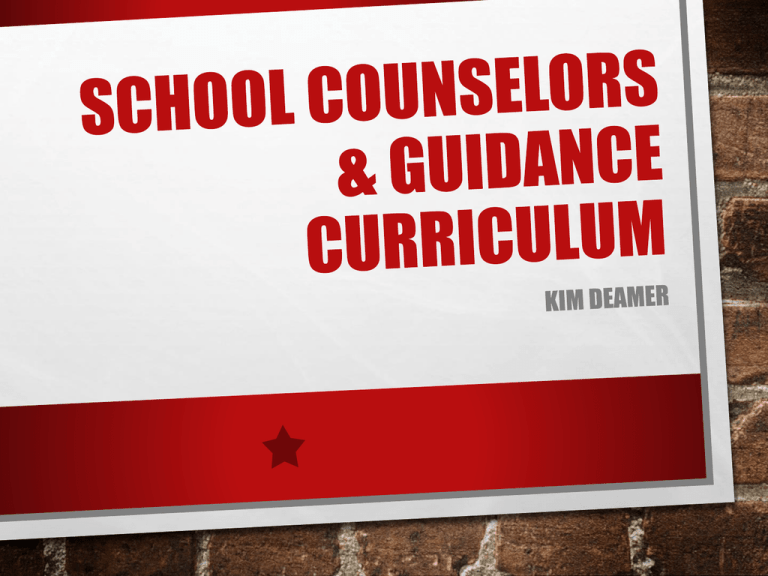
WHAT KIND OF STUDENTS DO YOU HAVE? GUIDANCE CURRICULUM • WHAT DO YOU KNOW ABOUT IT? GUIDANCE CURRICULUM • According to the American School Counselor Association (ASCA): • Counselors provide a “written instructional program that is comprehensive in scope, preventative and proactive, developmental in design, coordinated by school counselors, and delivered, as appropriate, by school counselors and other educators (ASCA, 2005, pg. 40) RESEARCH • Research suggests that Guidance curriculum is as powerful and meaningful as small group counseling (Nassar-Mcmullan & Cashwell, 1997; Shechtman & Bar-El, 1994; Shechtman, Bar-El, & Hadar, 1997) • A Metanalysis study by Whitston et al (2008) found that all students benefited from Guidance curriculum offerings. Those who benefited most were: • Middle School students, and then • High School students • Yes, elementary students had the smallest benefit, although we tend to think that most guidance curriculum is delivered at this level. GUIDANCE CURRICULUM (AND CAREER GUIDANCE) FROM THE UTAH MODEL PROGRAM REVIEW • WE DETERMINE WHAT GUIDANCE CURRICULUM TO DELIVER BY: • • • • DATA ANALYSIS OF NEEDS ASSESSMENT & TEACHER CROSSWALK SCHOOL IMPROVEMENT PLAN STUDENT COMPETENCIES GAPS IN ACHIEVEMENT • • • PROVIDED YEARLY • APPROPRIATE NEXT STEP PLANNING CTE INTRO IN 7TH CAREER EXPLORATION AND DEVELOPMENTAL ACTIVITIES WITH PATHWAYS PROVIDED MULTIPLE TIMES @ YEAR ANALYZING DATA: Teachers Crosswalk GUIDANCE CURRICULUM (AND CAREER GUIDANCE) FROM THE UTAH MODEL PROGRAM REVIEW • WE DETERMINE WHAT GUIDANCE CURRICULUM TO DELIVER BY: • • • • DATA ANALYSIS OF NEEDS ASSESSMENT & TEACHER CROSSWALK SCHOOL IMPROVEMENT PLAN STUDENT COMPETENCIES GAPS IN ACHIEVEMENT STUDENT OUTCOMES STUDENT OUTCOMES • Academic/learning Development • Life/career development • Multicultural/global citizen development • Personal/social development ACADEMIC/LEARNING DEVELOPMENT STANDARD A: Students will acquire the attitudes, knowledge, and skills that contribute to effective learning in school and across the lifespan. Improve academic self-concept Acquire skills for maximizing learning Achieve school success • • AL:A1.1 Articulate feelings of competence and confidence as learners • • • • • • • • • AL:A1.3 Understand individual strengths and how to remediate or compensate for weaknesses • • AL:A3.5 Connect to school in positive ways AL:A1.2 Identify and apply attitudes, expectations, and behaviors which lead to successful learning AL:A2.1 Apply time-management and task-management skills AL:A2.2 Demonstrate how effort and persistence positively affect learning AL:A2.3 Know when and how to ask for help or information from faculty, staff, family, and peers AL:A2.4 Apply knowledge of learning styles to positively influence school performance AL:A3.1 Develop basic skills (in math, reading, writing, technology, etc.) AL:A3.2 Learn and apply critical thinking skills AL:A3.3 Develop a pattern of regular school attendance AL:A3.4 Demonstrate the ability to work independently, as well as cooperatively with other students AL:A3.6 Apply the study and homework skills necessary for academic success SPECIFIC INDICATORS AN IDEA…. • SURVEY INDIVIDUAL NEEDS • CREATE AN EXCEL FILE OF WORKSHOPS NEEDED • INVITE SPECIFIC STUDENTS TO ATTEND SPECIFIC WORKSHOPS, GROUPS OR INDIVIDUAL COUNSELING TO MEET THOSE NEEDS WHO NEEDED WHAT? • Groups: • Empowerment group (self-esteem, positive attitude, coping skills, self-care, interpersonal relationships, utilizing resources ) • Study Skills • Individual counseling: • Careers • Some students who requested individual counseling instead of a workshop or group WORKSHOPS (G.C.) (In order of numbers of students needing the topic) • Resume Writing • Interviewing Skills • Choosing a career (non Utah futures style) • Time Management • Stress Management • ATC tour • Test ANXIETY • Goal setting and action plans • Service Project HOW? • Excel file provided name of students for each need. • Scheduled all workshops/groups/counseling from the end of March through the beginning of May during non-testing times, (students had an option as to which class period to miss in many instances). • Some workshops were provided by community partners (i.e.. Michael Quayle, Human Resources Director for Autoliv, did the workshop on interviewing, ATC did the tour while we arranged permission slips and the bus). RESULTS • Met specific needs of students • More active participation: Students knew they would be invited and they came (average 92% attendance) • Students appreciated the workshop/group they were participating in and actually thanked me for the it as they were leaving. • It was fun for me as a school counselor to indeed ‘see’ that I was making a difference QUESTIONS? REFERENCES • ASCA (2005). The ASCA National Model: A framework for school counseling programs (2nd ed.). Alexandria, VA • Nassar-McMIllan, S.C., & Cashwell, C.S. (1997) Building self-esteem of children and adolescents through adventure-based counseling. Journal of Humanistic Education and Development, 36, 59-67. • Rowley, W. J., Stroh, H. R. & Sink, C. A. (2005) Comprehensive guidance and counseling programs’ use of guidance curricula materials: A survey of national trends. Professional School Counselor, 8, 296-304. • Whitston, S. C. Rahardja, D. Eder, K. & Tai, W. L. (2008). School counseling outcome: A meta-analytic examination of interventions. Unpublished manuscript, Indiana University, Bloomington.


